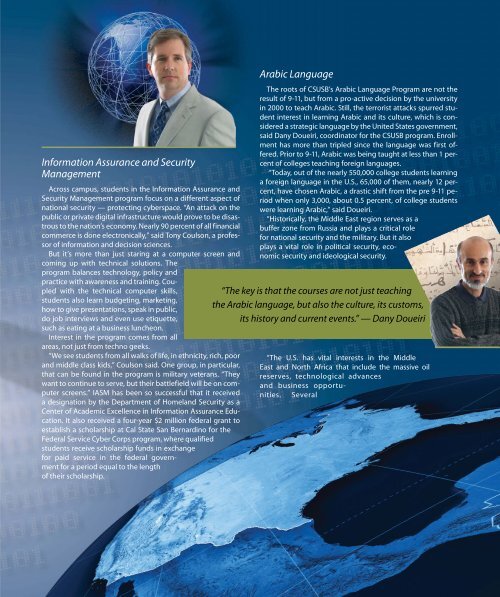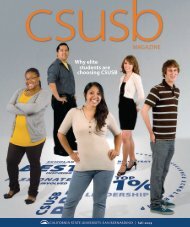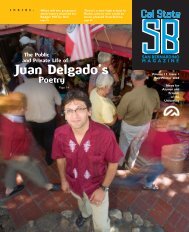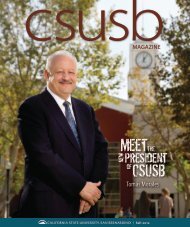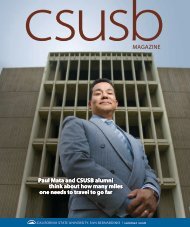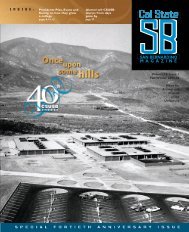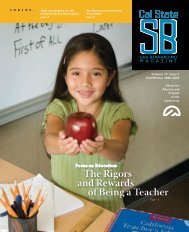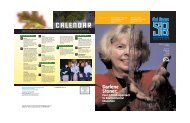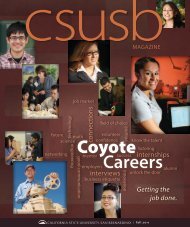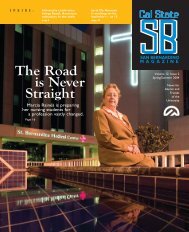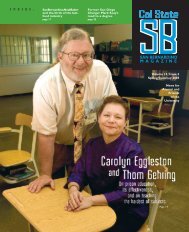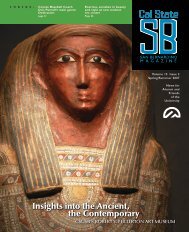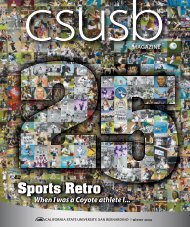Academic forces on the national security front - CSUSB Magazine ...
Academic forces on the national security front - CSUSB Magazine ...
Academic forces on the national security front - CSUSB Magazine ...
- No tags were found...
You also want an ePaper? Increase the reach of your titles
YUMPU automatically turns print PDFs into web optimized ePapers that Google loves.
Informati<strong>on</strong> Assurance and SecurityManagementAcross campus, students in <strong>the</strong> Informati<strong>on</strong> Assurance andSecurity Management program focus <strong>on</strong> a different aspect ofnati<strong>on</strong>al <strong>security</strong> — protecting cyberspace. “An attack <strong>on</strong> <strong>the</strong>public or private digital infrastructure would prove to be disastrousto <strong>the</strong> nati<strong>on</strong>’s ec<strong>on</strong>omy. Nearly 90 percent of all financialcommerce is d<strong>on</strong>e electr<strong>on</strong>ically,” said T<strong>on</strong>y Couls<strong>on</strong>, a professorof informati<strong>on</strong> and decisi<strong>on</strong> sciences.But it’s more than just staring at a computer screen andcoming up with technical soluti<strong>on</strong>s. Theprogram balances technology, policy andpractice with awareness and training. Coupledwith <strong>the</strong> technical computer skills,students also learn budgeting, marketing,how to give presentati<strong>on</strong>s, speak in public,do job interviews and even use etiquette,such as eating at a business lunche<strong>on</strong>.Interest in <strong>the</strong> program comes from allareas, not just from techno geeks.“We see students from all walks of life, in ethnicity, rich, poorand middle class kids,” Couls<strong>on</strong> said. One group, in particular,that can be found in <strong>the</strong> program is military veterans. “Theywant to c<strong>on</strong>tinue to serve, but <strong>the</strong>ir battlefield will be <strong>on</strong> computerscreens.” IASM has been so successful that it receiveda designati<strong>on</strong> by <strong>the</strong> Department of Homeland Security as aCenter of <str<strong>on</strong>g>Academic</str<strong>on</strong>g> Excellence in Informati<strong>on</strong> Assurance Educati<strong>on</strong>.It also received a four-year $2 milli<strong>on</strong> federal grant toestablish a scholarship at Cal State San Bernardino for <strong>the</strong>Federal Service Cyber Corps program, where qualifiedstudents receive scholarship funds in exchangefor paid service in <strong>the</strong> federal governmentfor a period equal to <strong>the</strong> lengthof <strong>the</strong>ir scholarship.Arabic LanguageThe roots of <strong>CSUSB</strong>’s Arabic Language Program are not <strong>the</strong>result of 9-11, but from a pro-active decisi<strong>on</strong> by <strong>the</strong> universityin 2000 to teach Arabic. Still, <strong>the</strong> terrorist attacks spurred studentinterest in learning Arabic and its culture, which is c<strong>on</strong>sidereda strategic language by <strong>the</strong> United States government,said Dany Doueiri, coordinator for <strong>the</strong> <strong>CSUSB</strong> program. Enrollmenthas more than tripled since <strong>the</strong> language was first offered.Prior to 9-11, Arabic was being taught at less than 1 percentof colleges teaching foreign languages.“Today, out of <strong>the</strong> nearly 550,000 college students learninga foreign language in <strong>the</strong> U.S., 65,000 of <strong>the</strong>m, nearly 12 percent,have chosen Arabic, a drastic shift from <strong>the</strong> pre 9-11 periodwhen <strong>on</strong>ly 3,000, about 0.5 percent, of college studentswere learning Arabic,” said Doueiri.“Historically, <strong>the</strong> Middle East regi<strong>on</strong> serves as abuffer z<strong>on</strong>e from Russia and plays a critical rolefor nati<strong>on</strong>al <strong>security</strong> and <strong>the</strong> military. But it alsoplays a vital role in political <strong>security</strong>, ec<strong>on</strong>omic<strong>security</strong> and ideological <strong>security</strong>.“The key is that <strong>the</strong> courses are not just teaching<strong>the</strong> Arabic language, but also <strong>the</strong> culture, its customs,its history and current events.” — Dany Doueiri“The U.S. has vital interests in <strong>the</strong> MiddleEast and North Africa that include <strong>the</strong> massive oilreserves, technological advancesand business opportunities.SeveralNkechiyere Eboka has worked as a volunteer at St.Bernardine Medical Center in San Bernardino.(Photo by Lori Krueger)csusb magazine 2010-2011 | 11


